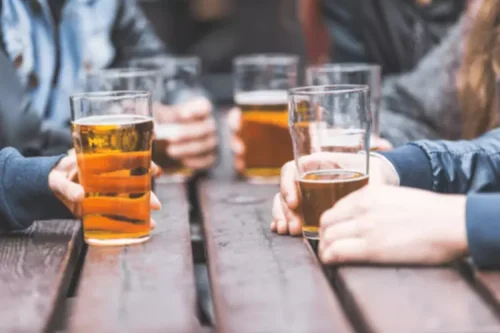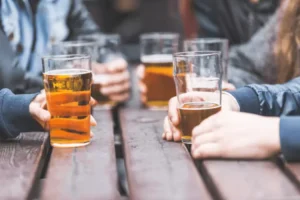Drinking alcohol and getting older What do I need to know?

Metabolism plays a crucial role in alcohol tolerance, and it can be affected by age. https://ecosoberhouse.com/ As we get older, the metabolic rate tends to slow down, causing alcohol to be metabolised at a slower pace. This slower metabolism can lead to higher blood alcohol concentrations and a longer-lasting intoxicating effect. Therefore, the body becomes less efficient at processing alcohol, contributing to the diminishing tolerance experienced by older adults.
Drug interactions
At age 61, body water decreases in both sexes—to 57 percent in men and 50 percent in women. Most medications and alcohol don’t interact well with each other. Not only will alcohol make conditions like hypertension and diabetes worse, but it also mixes poorly with the medications typically used to treat those conditions. Alcohol abuse in older adults is a quiet but serious problem. It may not be as Alcoholics Anonymous easy to recognize, but alcoholism in older adults is common. If you believe that you or a loved one has problems with alcohol, you can contact your family doctor and they can perform a substance abuse screening.

Alcohol can worsen other chronic diseases
- Healthcare experts warned of the following negative effects of alcohol that can worsen as people age.
- If you believe that you or a loved one has problems with alcohol, you can contact your family doctor and they can perform a substance abuse screening.
Health issues might lead you to despair or even ruminate on your own mortality. Drinking can seem like a way to escape from these difficult feelings or provide relief from chronic pain and discomfort. For example, blood pressure medications such as beta-blockers can magnify the effects of alcohol, causing a dangerous drop in blood pressure. Similarly, combining sedatives with alcohol can result in excessive drowsiness and impaired motor function, increasing the risk of accidents and falls.

Top doctors in ,

It can also include effects on attention and driving skills, he says. Nearly half of older adults aged 65 and older report having consumed alcohol in the past year. They may have a drink at a social event or party, to enhance their mood, or as a means of coping with a difficult symptom such as insomnia. Some older adults even drink alcohol for perceived positive health effects. When you drink, try to have a meal or snack before having a cocktail or have a glass of wine with a meal, which will slow absorption of alcohol, Weaver says. And be sure to drink plenty of water or another non-alcoholic beverage—perhaps alternating these with alcoholic drinks—to help you stay hydrated.
Dr. Marc Siegel: ‘We need to know’ the origins of COVID-19 to ‘prepare for the next pandemic’
Making a conscious effort to be mindful—present in the moment and more appreciative of each sensation, rather than drinking on autopilot—can help reduce the amount you end up drinking by the end of the night. Drinking water won’t prevent a hangover, but it might help fill your stomach and discourage you from chugging alcohol. Taking bites of food between sips can have similar benefits. You might want to limit yourself to a certain number of drinks per sitting. If necessary, record how much you’re consuming, so you alcohol and aging can better track your drinking habit. They’re not responsible for your behavior, but they can offer gentle reminders or avoid encouraging you to drink more.
Alcohol tolerance is often defined as the need for higher alcohol consumption to achieve the desired effects previously achieved with lower amounts. This increased tolerance can lead individuals to consume larger quantities of alcohol, which can be problematic, especially for older adults. Medicines taken by older adults are more likely to have serious interactions with alcohol and drugs, according to the National Institute on Alcohol Abuse and Alcoholism (NIAAA). Many prescribed and over-the-counter medicines and herbal products can interact negatively with alcohol. Medicines and alcohol can interact even if they’re not taken at the same time.
ways to curb your drinking

Unhealthy drinking can lead to other problems over time, such as increased risk of falls, dangerous medication interactions, increased risk of cancer, and, in more severe cases, liver disease and early mortality. As we age, our alcohol tolerance naturally diminishes due to physiological changes and the aging process itself. Understanding these changes and their effects is crucial for older adults who want to continue enjoying alcohol responsibly. Older adults may find themselves more susceptible to the effects of alcohol due to changes in their bodies as they age. Metabolism slows down, leading to alcohol staying in their system longer and affecting them more profoundly than when they were younger. Additionally, aging often brings about other health conditions that can be exacerbated by alcohol consumption, such as high blood pressure or diabetes.
- Recognising and adapting to the changes in alcohol tolerance is crucial for older adults to continue enjoying alcohol safely.
- In either case, taking care of an animal can make you feel needed, add a new sense of purpose, and benefit many different aspects of your life.
- She started her career as a general news and lifestyle reporter and has interviewed legends like Maya Angelou and covered the 2014 Olympics from Sochi, Russia.
- Although drinking and alcohol problems are less common in older adults than younger people, alcohol use in older adulthood brings specific risks for seniors.
- This can be dangerous for people who already have slower reaction times and poor balance without alcohol.
Find more top doctors on
BetterHelp is an online therapy service that matches you to licensed, accredited therapists who can help with depression, anxiety, relationships, and more. Take the assessment and get matched with a therapist in as little as 48 hours. Don’t fall for the belief that you’re too old to learn something new. Take dance lessons, experiment with a musical instrument, or enroll in a community college course. Relaxation practices such as mindfulness meditation, visualization, and deep breathing exercises can help to combat stress without turning to alcohol.

